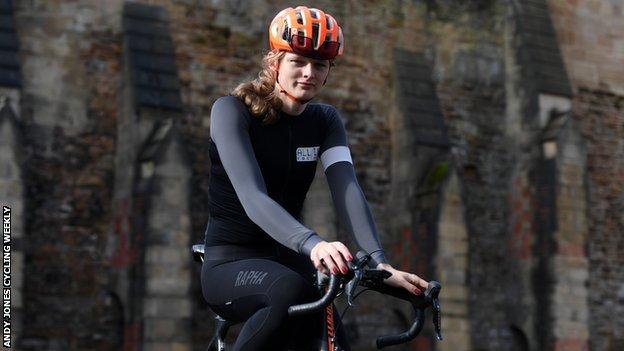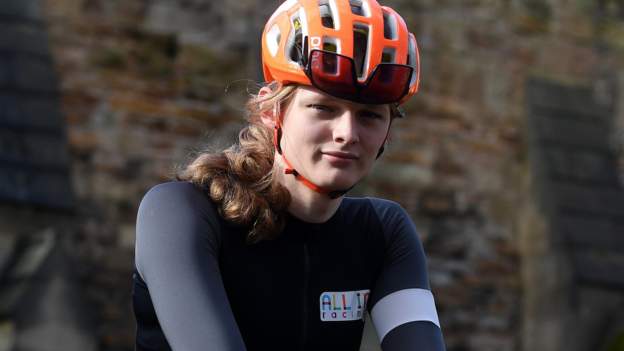
Transgender women are the “current punching bag” in society and are the targets of “the culture war”, says cyclist Emily Bridges.
In an interview with DIVA magazine, Bridges called on LGBT “allies” to “put their voice out there” in support.
In April, the 21-year-old was stopped from competing in her first elite women’s race by cycling’s world governing body, the UCI.
The UCI is currently assessing her eligibility to race in women’s events.
Bridges says she “does not have any advantage” over her competitors, and can prove it with data.
“We’re the current punching bag populist movements like to go for. We are, at the moment, who the culture war is against,” said Bridges.
“There needs to be more positive voices and more education. People are constructing opinions off not the whole story.
“The more studies that are done, the more concrete evidence there will be.
“Sport acts as a microcosm to the rest of society, so with the patriarchal structure that exists in the rest of society, that’s intensified in sport.”
At the height of the debate around Bridges’ participation, a letter signed by a group of elite female cyclists – including retired Olympians, scientists and researchers – called for the UCI to “rescind” its transgender policy and said there was “deep regret” at the “crisis situation”.
The group said some female cyclists in the UK “were willing to boycott” races in order for the UCI and British Cycling “to hear their concerns about fairness in their sport”.
Lord Coe issued a warning over the “very fragile” future of women’s sport, while a major review said transgender inclusion, fairness and safety “often cannot co-exist”.
Bridges came out as transgender in 2020 and began hormone therapy last year as part of her gender dysphoria treatment.
While having hormone therapy, Bridges continued to compete in men’s races, finishing 43rd out of 45 riders in the elite men’s criterium at the Loughborough Cycling Festival in May 2021 and, in September that year, placing second to last in the Welsh National Championship road race, a 12km lap behind the winner.
In 2022, in her final men’s race, Bridges won a men’s points race at the British Universities Championships.
“I could have just not ridden [in men’s events], which probably would have been somewhat better for my mental health and for affirming my identity,” she said. “I don’t know if it’s the right decision or not, but that’s what I did.”
She became eligible to compete in women’s events because of lowered levels of testosterone. British Cycling’s transgender regulations – which have now been suspended pending a review – required riders to have had testosterone levels below five nanomoles per litre for a 12-month period prior to competition.
But days before the National Omnium Championships, the UCI told British Cycling that, because international ranking points are allocated at national championship events, Bridges’ participation could only be allowed once her eligibility to race in international competitions was confirmed.
Bridges said it was “awful” to be ruled out so close to the event taking place.
“Everything was kicking off saying, ‘oh, she’s gonna race and she’s gonna beat Laura Kenny’. I don’t know why they’re thinking that. I wasn’t doing that well,” she said.
“It’s like they automatically think I’m gonna beat a multiple Olympic champion, just because I’m trans.
“We knew it would create more uproar in the media and it blew everything up even more.”
Bridges previously said she had been “harassed and demonised” after being told she could not compete, and deleted her social media for two weeks.
British Olympic cycling gold medallist Katie Archibald – one of the most high profile current athletes to speak publicly on the issue but who did not sign the letter to the UCI – said both female and transgender athletes had “been let down” by existing inclusion policies, adding that transgender athletes must be welcomed into sport but without “sacrificing fairness”.
UK Sport chief executive Sally Munday expressed her “huge empathy” for Bridges and said the organisation would fund Bridges – if she was selected and given approval by the UCI to compete for Britain in the future.
“It’s been a struggle. I’ve been trying to take each day by day, get through the day and get to the other side, because there’s been some pretty dark times,” Bridges told DIVA.
“There’s so much hate and criticism that I just don’t look at it. I know it is happening and I try to have that drive me, but that’s easier said than done.”
She added: “I want to make the world a better place. I want to inspire people and help people through their journey to be who they are, and try to act as a bit of a role model.”
‘I don’t have any advantage’
Many argue that transgender women should not compete in elite women’s sport because of any advantages they may retain – but others argue that sport should be more inclusive.
The debate centres around the balance of inclusion, sporting fairness and safety in women’s sport – essentially, whether trans women can compete in female categories without their biological sex giving them an unfair advantage or presenting a threat of injury to female competitors.
The International Olympic Committee’s framework on transgender athletes – released in November – states that there should be no assumption that a transgender athlete automatically has an unfair advantage in female sporting events, and places responsibility on individual federations to determine eligibility criteria in their sport.
Asked about her response to people who do not want female transgender athletes competing in elite women’s sport, Bridges said: “I understand how you’d come to this conclusion because a lot of people still view trans women as men with male anatomies and physiologies.
“But hormone replacement therapy has such a massive effect. The aerobic performance difference is gone after about four months.
“There are studies going on for trans women in sport. I’m doing one and the performance drop-off that I’ve seen is massive. I don’t have any advantage over my competitors and I’ve got data to back that up.”
This view is disputed by some sports scientists, who say the physiological differences established during puberty can create “significant performance advantages (between men and women)”.
Asked about her message for other transgender athletes, Bridges said although it “might take a few years”, it will “get better”.
